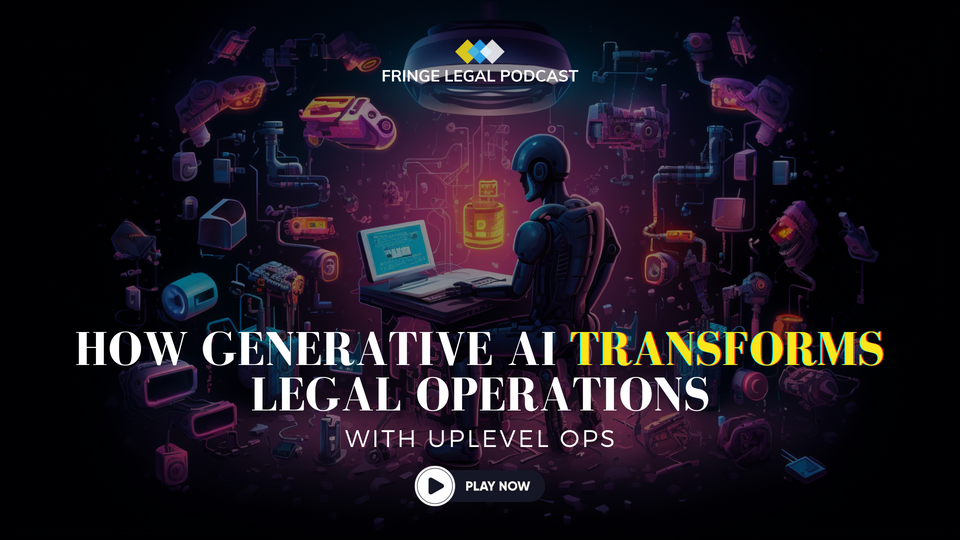Workflow Reimagined: How Generative AI Transforms Legal Operations

Catch up on part 1 here.
Legal technology is on the cusp of a generational shift. Virtually overnight, generative AI tools like ChatGPT have captured the attention and imaginations of millions worldwide. Their ability to generate persuasive text, summarize documents, answer questions, and automate workflows has massive disruptive potential across industries.
Nowhere is this more apparent than in law, where AI-driven transformation has long been predicted yet hasn’t fully materialized. Will this time finally be different? Can generative AI enable the step-change in productivity and efficiency that legal teams crave?
🎧 Listen to the supporting episode
To dive deeper into how legal teams are exploring GenAI we spoke with Stephanie Corey, founder of legal operations consultancy UpLevel Ops, and Brandi Pack, UpLevel’s Legal Tech Analyst & AI Consultant.
Brandi, through her husband’s work, got early access to GPT-4 in 2022, long before ChatGPT launched.
“Getting access to GPT-4 before anyone else and seeing its capabilities was mind-blowing. We could immediately see this was going to change the world.”
Meanwhile, Steph and others at UpLevel Ops started out skeptical, having been let down before by previous generations of overpromised, underdelivering AI.
“When Brandi comes to the team meeting and says this great new AI tool is out, everybody did an eye roll. They were disenchanted with how little practical use we’d seen from other AI tools.”
But Brandi forced the issue, determined to prove generative AI’s immense potential. She describes almost having to drag her team kicking and screaming into using it. However, the hands-on experience quickly turned skepticism into belief.
“I forced Generative AI on my team at UpLevel Ops. They were skeptical at first, but soon saw the time savings and capabilities.”N.B. Some quotes have been edited slightly to make them more suitable for print.
From Fiction to Fruition
So, what exactly makes generative AI different from past technologies? Why has it captured attention unlike anything before?
Brandi explains that earlier tools focused on narrow AI designed to perform specific tasks. This required extensive, meticulous training by humans. Generative AI models like GPT-3 and 4 take the opposite approach - ingesting massive datasets of text and dialog to create broad, generalizable intelligence.
The models continuously self-improve by recognizing patterns in their training data. Their foundations enable them to perform a staggering variety of tasks, from content creation to classification to conversation. And it’s all accessible through natural language prompts, no coding required.
As UpLevel Ops team members overcame their initial doubts and began practically applying generative AI, the use cases became apparent. Research and drafting tasks that once took hours could be completed in minutes. Summarizing contracts or studies went from afternoons to seconds. The technology improved productivity and creativity in myriad ways.
Seeing these benefits firsthand won over initial skepticism and spurred further adoption. This organic journey of exploration mirrors the path many legal teams are following. Generative AI is transitioning rapidly from fiction to fruition. This is what inspired the UpLevel Ops team to launch its Generative Artificial Intelligence (Gen AI) Management Services for legal professionals.
The Human Experience
While computers can now write, summarize, research, and reason with astonishing prowess, Steph emphasizes they still lag behind humans in understanding nuance and context. She notes that education and emotional intelligence remain uniquely human capabilities.
This means while certain legal roles and processes will transform through automation, the importance of human oversight endures. Steph believes successfully leveraging generative AI is not about pitting human vs. machine. Rather, it’s integrating their complementary strengths.
“There will likely be shifts in hiring and job roles due to generative AI’s capabilities, but people who embrace it will be better positioned. Focus should be on using it to augment human abilities.”
For legal professionals, this entails using generative AI’s raw speed and knowledge to bolster uniquely human skills like reasoning, communication, and strategy. Tasks that are repetitive, data-driven, and rules-based are ripe for automation. This frees up time and mental bandwidth for the complex problem-solving at which humans excel.
Brandi is optimistic that generative AI will enhance job satisfaction by relieving burdensome grunt work. This creates opportunities to add greater value.
“The people who are going to be able to keep their jobs are the ones who embrace the technology, who are using it...I have never laughed so hard using this technology, it’s just a joy.”
While percentages and proportions will shift, Steph believes generative AI will elevate human abilities rather than wholesale replace roles. However, adoption is critical for legal professionals to benefit from augmenting technology rather than being displaced by it.
Workflow Reimagination
Where does workflow automation fit into the equation? Brandi sees it as the bridge enabling generative AI to transform operations. She believes generative AI will completely reimagine legal workflow, connecting previously disparate systems into intelligent ecosystems.
“I think workflow automation will be at the center of how generative AI transforms operations. AI agents will be able to drive software, research information, and prompt each other.”
Brandi explains that advanced implementations of generative AI involve multiple AI “agents” working together autonomously. Managing agents can be given high-level goals and delegate work to worker agents. These agents access software APIs, web resources, and each other to execute tasks end-to-end without human oversight.
Natural language AI interfaces update human collaborators on progress and ask clarifying questions as needed. The end state is unified ecosystems with humans setting strategic goals, generative AI agents automating workflows through collaboration, and chatbots providing friendly interfaces.
“Generative AI will swallow everything up at some point. We’ll see general AI legal assistants that expand capabilities to automate processes across the board.”
This re-imagination of workflow is in its early stages, but rapid evolution is enabled by the versatility of large language models underlying generative AI systems. As vendors incorporate these flexible foundations into their offerings, smart interoperability and automation will grow exponentially.
From Abstraction to Action
With possibilities abound, legal teams are urgently seeking the best pathways forward. UpLevel Ops has guided numerous organizations on their generative AI journeys by drawing on their own experiences.
Steph finds clients are still uncertain about how to practically implement generative AI. Rather than plunge headfirst into the unknown, she recommends starting with small, low-risk applications.
“If you’re going to have to write something, start with a generative AI tool. It’ll give you a great starting point and save hours of time.”
For example, before drafting a memo, first discuss its goals with ChatGPT. Edit its output into an excellent starting draft. Small wins build familiarity and confidence to expand use cases.
Starting gradually helps assess generative AI’s abilities and limitations. Testing on low-stakes tasks minimizes risk. Brandi notes that sound governance must accompany adoption to prevent potential harm from uncontrolled AI systems.
“To get started, organizations should focus on developing policies, procedures and processes to manage generative AI usage.”
With foundations in place, AI expertise can then be cultivated through hands-on experimentation. Steph suggests individuals try prompts around their daily work. Documentation helps institutionalize knowledge and prompts.
“Document your prompts and share them. Prompt engineering is critical to using generative AI effectively.”
On the technical side, Brandi encourages teams to explore leading pre-trained models through user-friendly interfaces like ChatGPT, DALL-E 2, and GitHub Copilot.
“Try tools like ChatGPT, DALL-E 2, and Playground AI. Experiencing them firsthand will show the possibilities.”
She also recommends tapping law firms’ expertise, as they’ve been early and aggressive adopters of generative AI capabilities.
“Ask your top law firms how they are using generative AI. Law firms have been quick adopters.”
Blending governance, hands-on adoption, and tapping collective knowledge helps demystify generative AI. It enables legal teams to leverage the technology safely and effectively.
An Imperative, Not an Option
Looking ahead, Brandi sees incorporating generative AI as an urgent imperative for legal technology vendors. She believes delay risks obsolescence, as broad capabilities subsume niche offerings.
“Vendors need to start incorporating generative AI or they’ll get left behind. The ones who do will swallow up the competition.”
UpLevel Ops is advising vendors on high-value starting points based on client needs. But incremental additions alone won’t cut it long-term, given generative AI’s potential. Its flexible foundations enable rapid expansion of features and benefits.
Legal tech vendors who go all-in on generative AI will gain an insurmountable competitive edge. Teams seeking technology solutions should evaluate vendors’ commitment and expertise in this pivotal new capability.
The Future is Now
Legal technology has reached an inflection point. Generative AI possesses the unprecedented potential to transform productivity, creativity, knowledge, and insight. It enables the reimagination of workflows and processes through intelligent automation.
Realizing this future rests on thoughtfully incorporating AI capabilities with human talents and governance. To achieve your goals, it's important to take deliberate and intentional steps while remaining committed and urgent in your actions. Organizations able to walk this tightrope will propel strategic success and competitive advantage.
The window for legal teams and technology vendors to embrace generative AI is right now. As Steph concludes, “It’s an incredibly exciting time. The possibilities feel endless, but it’s up to us to determine the wisest path forward.” The future beckons.
Dig Deeper (reading list)
- (PDF) UpLevel Ops' AI Bundle (resources on implementing generative AI)
- Elevating the Human Experience: How Gen AI Transforms Legal Workflow Automation
- Moving Past the AI Hype - Conversation with LexisNexis' Jeff Pfeifer
- Why leveraging artificial intelligence in legal tech is a challenge? (2021 view - have things changed?)
- Generative AI & the Legal Profession LexisNexis 2023 Survey Report
- The Promise and Peril of AI Legal Services to Equalize Justice
- What’s the future of generative AI? An early view in 15 charts






Become a Fringe Legal member
Sign in or become a Fringe Legal member to read and leave comments.
Just enter your email below to get a log in link.